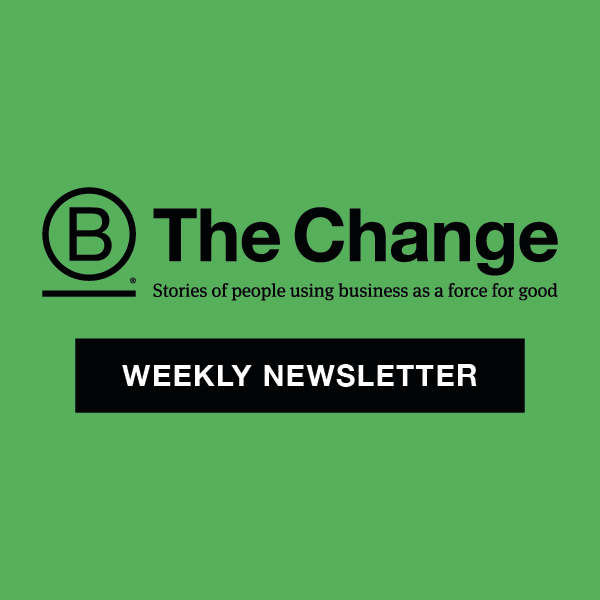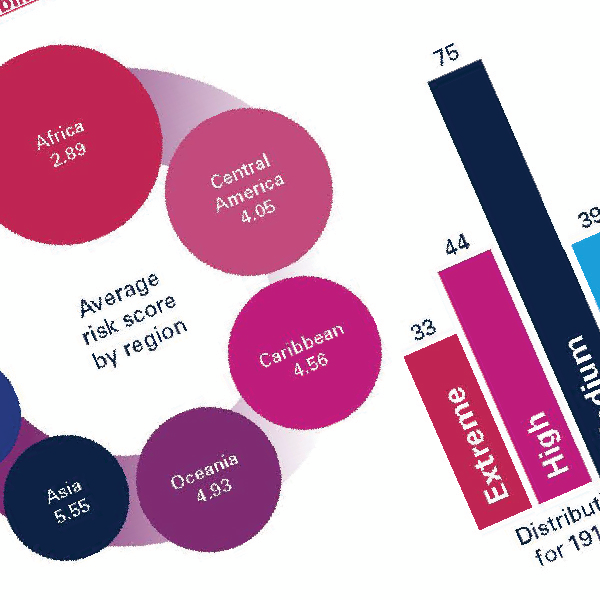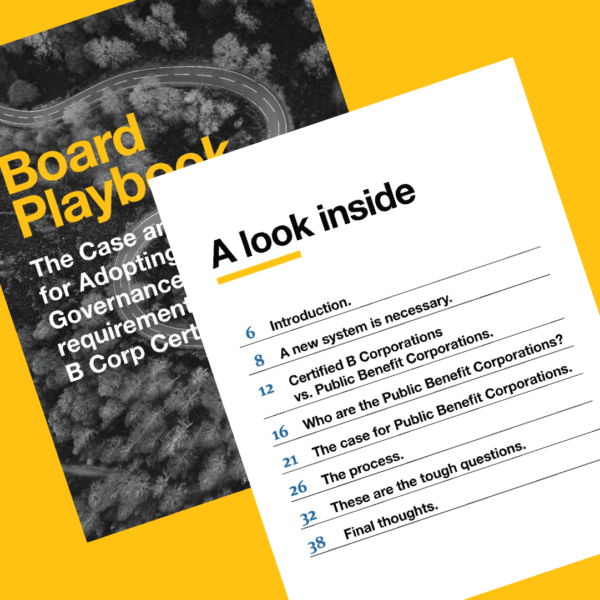Create an Economy That Works for All: 4 Tools to Advance Work with Purpose
January 4, 2022
For businesses that operate with a focus beyond profit, the tumult during recent years has created new challenges and unearthed long-standing problems in our systems and society. As a new calendar year begins, companies that choose to incorporate purpose and people into their operations also are helping to create more resilient and inclusive businesses and economies.
Certified B Corporations are among those companies committed to using their businesses as a force for positive change. In the U.S. and Canada, these companies are shaping that change by advancing climate justice, racial equity, and a stakeholder-driven economy — the three pillars of B Lab U.S. & Canada’s Theory of Change.
Creating a more inclusive and resilient economy isn’t simple or speedy, and B Corps don’t have a singular solution to get there. But they are developing and sharing resources, partnerships, and practices — some highlighted below — to build upon as they start or continue the journey while learning and unlearning.

Subscribe to B The Change Weekly
Learn more about the growing movement of Certified B Corporations using business as a force for good, and sign up to receive the B The Change Weekly newsletter for more stories like this one, delivered straight to your inbox once a week.
Why Businesses Must Center Climate Action in People and Justice
Warnings and signs of the escalating climate crisis are spurring more people and organizations to action as threats grow larger and closer with each day. As the single largest contributor to climate change, businesses are realizing their responsibility to act — and those in the B Corp community are doing so with a commitment to the people most affected.
By committing to climate justice, B Corps and other businesses recognize that those who are least responsible for climate change are more likely to feel its effects and that their needs, voices, and leadership must be central to climate action and advocacy.
To help B Corps and other companies take responsibility to reduce their negative environmental impacts, B Lab and partners created the Climate Justice Playbook for Business. It includes insights from over 40 B Corps and deeper case studies on four companies — Guayakí Yerba Mate, Patagonia, Pukka Herbs, and Seventh Generation — that highlight how they are seeking to advance climate justice in their operations, supply chains, and the communities they impact so that other businesses can learn from their approaches and practices.

The Climate Justice Playbook for Business
This practical guide from B Lab features information to help business leaders understand the intersection of climate action and social justice and advance a justice-centered approach to climate action.
The Case and Process for Adopting Benefit Governance
This is a crucial time for action on large global challenges — including growing economic disparity, an accelerating climate crisis — and businesses can play a key role in change by adopting a model for a new economy that delivers value to more than just shareholders. By shifting to stakeholder capitalism and pursuing benefit corporation status, businesses can embed their company’s purpose and ensure a positive legacy while also building a strong bottom line.
More than 4,000 B Corps around the world — including Patagonia, Ben & Jerry’s, Allbirds, and Beautycounter — are leading the way by operating under this governance model to deliver stakeholder value and take responsibility for negative impacts. To help business leaders learn more and navigate the journey to adopt benefit corporation status as a requirement of B Corp Certification, B Lab offers this downloadable resource, the Board Playbook, to lay out the process and demystify the risks.
In the playbook’s introductory letter, Allbirds Co-Founder Joey Zwillinger shares why the company pursued benefit corporation status and how that decision has shaped and will drive the business for the long term:
“Adopting this governance framework has legal tradeoffs. On one hand, it provides broader latitude to executives to act on behalf of public beneficiaries in addition to shareholders. On the other hand, it also creates liabilities for companies and its executives such that investors can hold the company accountable to achieving the public benefits it has chartered in its governance documents. This is flexibility and accountability. Great leaders should have both, but it takes courage and a sense of responsibility for what the executive’s role is in the world.”

The Board Playbook
To help business leaders navigate the journey to adopt benefit corporation status as a requirement of B Corp Certification, B Lab U.S. & Canada provides this resource to lay out the process and demystify the risks.
How Companies Can Advance Racial Equity
As consumers, workers, and society at large demand improved outcomes for People of Color, some business leaders are seeking tools and taking steps to help shape an economy that advances racial equity. B Corps are among the companies looking to learn and, in the case of upending systemic racism, unlearn practices and have honest conversations about areas of strength and areas in need of reflection and improvement.
B Lab, the nonprofit that assesses and certifies B Corps, is also committed to work in deep collaboration to advance racial equity practices and principles as a new standard in business alongside PolicyLink, JUST Capital, and FSG, who have joined forces to launch the Corporate Racial Equity Alliance. B Lab is a flagship partner to the Alliance and contributed to the critical resource, The 2021 CEO Blueprint for Racial Equity.
The Blueprint recognizes the need for organizations to implement enterprise-wide strategies, meaning the efforts are not housed in a single department but are coherent, transparent, and resourced. To support leaders in that effort, the Blueprint offers five foundational principles to guide organizations.
How a Stakeholder Engagement Model Supports All Workers
The coronavirus pandemic laid bare the inequitable nature of an economy based on the doctrine of shareholder primacy — an economy that deems making profits for shareholders, board members, and owners the sole, rightful purpose of a business. Over the last two years, resignations and labor shortages have rocked the job market, drawing renewed attention to inequitable salaries between corporate CEOs and frontline workers — many of whom were required to continue to show up in person for work in the pandemic’s early days. Women have left their jobs in record numbers as they face growing demands from home and heightened child care costs, among other issues.
These and other economic challenges are likely to persist and evolve, requiring businesses to balance the bottom line with support and protections for workers and to delve deeper into their work to advance justice, equity, diversity and inclusion. Stakeholder engagement — the involvement of all of those who are impacted by business and economic structures, including workers — provides a roadmap for businesses to be more inclusive and resilient, and to build a network of support for the people and places that companies rely upon.
The Future of Work Is Now downloadable guide report highlights B The Change articles from and about B Corps and their learnings on ways to redefine success in business. It includes real-world lessons and programs from B Corps that benefit workers as well as businesses, and demonstrates how incorporating stakeholder engagement can redefine and reshape capitalism for the better.

The Future of Work Is Now
The community of Certified B Corporations knows that profits don’t have to come at the expense of other stakeholders. Learn more in this report.
Sign Up for our B The Change Newsletter
Read stories on the B Corp Movement and people using business as a force for good. The B The Change Newsletter is sent weekly.